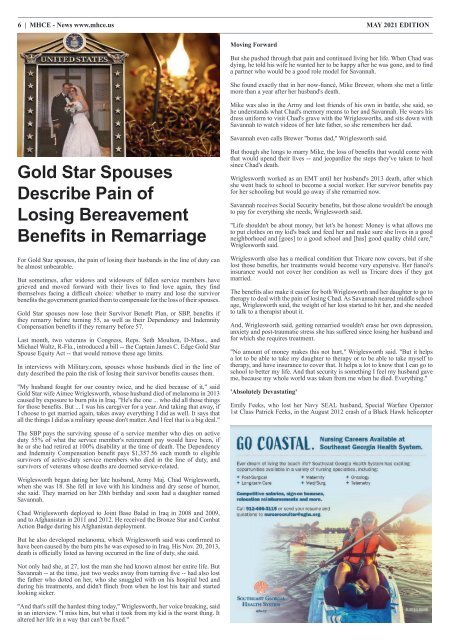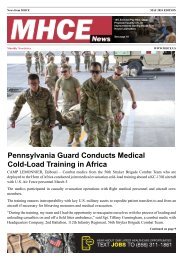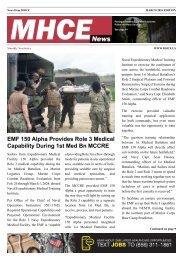May 2021 Newsletter
You also want an ePaper? Increase the reach of your titles
YUMPU automatically turns print PDFs into web optimized ePapers that Google loves.
6 | MHCE - News www.mhce.us MAY <strong>2021</strong> EDITION<br />
Moving Forward<br />
But she pushed through that pain and continued living her life. When Chad was<br />
dying, he told his wife he wanted her to be happy after he was gone, and to find<br />
a partner who would be a good role model for Savannah.<br />
She found exactly that in her now-fiancé, Mike Brewer, whom she met a little<br />
more than a year after her husband's death.<br />
Mike was also in the Army and lost friends of his own in battle, she said, so<br />
he understands what Chad's memory means to her and Savannah. He wears his<br />
dress uniform to visit Chad's grave with the Wriglesworths, and sits down with<br />
Savannah to watch videos of her late father, so she remembers her dad.<br />
Savannah even calls Brewer "bonus dad," Wriglesworth said.<br />
Gold Star Spouses<br />
Describe Pain of<br />
Losing Bereavement<br />
Benefits in Remarriage<br />
For Gold Star spouses, the pain of losing their husbands in the line of duty can<br />
be almost unbearable.<br />
But sometimes, after widows and widowers of fallen service members have<br />
grieved and moved forward with their lives to find love again, they find<br />
themselves facing a difficult choice: whether to marry and lose the survivor<br />
benefits the government granted them to compensate for the loss of their spouses.<br />
Gold Star spouses now lose their Survivor Benefit Plan, or SBP, benefits if<br />
they remarry before turning 55, as well as their Dependency and Indemnity<br />
Compensation benefits if they remarry before 57.<br />
Last month, two veterans in Congress, Reps. Seth Moulton, D-Mass., and<br />
Michael Waltz, R-Fla., introduced a bill -- the Captain James C. Edge Gold Star<br />
Spouse Equity Act -- that would remove these age limits.<br />
In interviews with Military.com, spouses whose husbands died in the line of<br />
duty described the pain the risk of losing their survivor benefits causes them.<br />
"My husband fought for our country twice, and he died because of it," said<br />
Gold Star wife Aimee Wriglesworth, whose husband died of melanoma in 2013<br />
caused by exposure to burn pits in Iraq. "He's the one ... who did all those things<br />
for those benefits. But ... I was his caregiver for a year. And taking that away, if<br />
I choose to get married again, takes away everything I did as well. It says that<br />
all the things I did as a military spouse don't matter. And I feel that is a big deal."<br />
But though she longs to marry Mike, the loss of benefits that would come with<br />
that would upend their lives -- and jeopardize the steps they've taken to heal<br />
since Chad's death.<br />
Wriglesworth worked as an EMT until her husband's 2013 death, after which<br />
she went back to school to become a social worker. Her survivor benefits pay<br />
for her schooling but would go away if she remarried now.<br />
Savannah receives Social Security benefits, but those alone wouldn't be enough<br />
to pay for everything she needs, Wriglesworth said.<br />
"Life shouldn't be about money, but let's be honest: Money is what allows me<br />
to put clothes on my kid's back and feed her and make sure she lives in a good<br />
neighborhood and [goes] to a good school and [has] good quality child care,"<br />
Wriglesworth said.<br />
Wriglesworth also has a medical condition that Tricare now covers, but if she<br />
lost those benefits, her treatments would become very expensive. Her fiancé's<br />
insurance would not cover her condition as well as Tricare does if they got<br />
married.<br />
The benefits also make it easier for both Wriglesworth and her daughter to go to<br />
therapy to deal with the pain of losing Chad. As Savannah neared middle school<br />
age, Wriglesworth said, the weight of her loss started to hit her, and she needed<br />
to talk to a therapist about it.<br />
And, Wriglesworth said, getting remarried wouldn't erase her own depression,<br />
anxiety and post-traumatic stress she has suffered since losing her husband and<br />
for which she requires treatment.<br />
"No amount of money makes this not hurt," Wriglesworth said. "But it helps<br />
a lot to be able to take my daughter to therapy or to be able to take myself to<br />
therapy, and have insurance to cover that. It helps a lot to know that I can go to<br />
school to better my life. And that security is something I feel my husband gave<br />
me, because my whole world was taken from me when he died. Everything."<br />
'Absolutely Devastating'<br />
Emily Feeks, who lost her Navy SEAL husband, Special Warfare Operator<br />
1st Class Patrick Feeks, in the August 2012 crash of a Black Hawk helicopter<br />
The SBP pays the surviving spouse of a service member who dies on active<br />
duty 55% of what the service member's retirement pay would have been, if<br />
he or she had retired at 100% disability at the time of death. The Dependency<br />
and Indemnity Compensation benefit pays $1,357.56 each month to eligible<br />
survivors of active-duty service members who died in the line of duty, and<br />
survivors of veterans whose deaths are deemed service-related.<br />
Wriglesworth began dating her late husband, Army Maj. Chad Wriglesworth,<br />
when she was 18. She fell in love with his kindness and dry sense of humor,<br />
she said. They married on her 20th birthday and soon had a daughter named<br />
Savannah.<br />
Chad Wriglesworth deployed to Joint Base Balad in Iraq in 2008 and 2009,<br />
and to Afghanistan in 2011 and 2012. He received the Bronze Star and Combat<br />
Action Badge during his Afghanistan deployment.<br />
But he also developed melanoma, which Wriglesworth said was confirmed to<br />
have been caused by the burn pits he was exposed to in Iraq. His Nov. 20, 2013,<br />
death is officially listed as having occurred in the line of duty, she said.<br />
Not only had she, at 27, lost the man she had known almost her entire life. But<br />
Savannah -- at the time, just two weeks away from turning five -- had also lost<br />
the father who doted on her, who she snuggled with on his hospital bed and<br />
during his treatments, and didn't flinch from when he lost his hair and started<br />
looking sicker.<br />
"And that's still the hardest thing today," Wriglesworth, her voice breaking, said<br />
in an interview. "I miss him, but what it took from my kid is the worst thing. It<br />
altered her life in a way that can't be fixed."


















